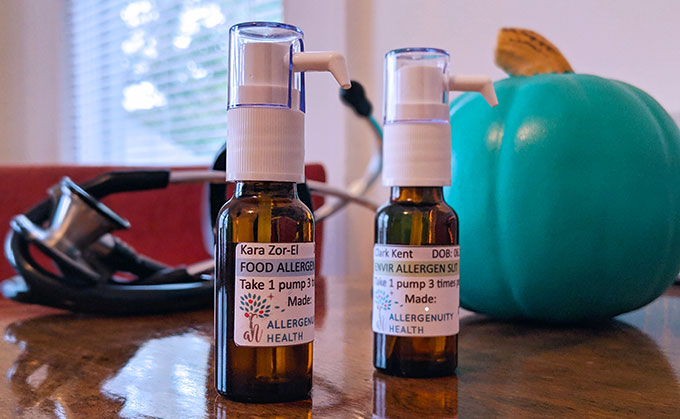A no-fuss immune treatment.
including liquid drops positioned under the tongue might safeguard individuals with peanut.
allergic reactions from responding if exposed.
Arise from a little research study of the treatment– called sublingual immunotherapy, or SLIT– competing those of a comparable treatment that likewise develops allergic reaction tolerance by exposing patients to little, everyday dosages of an irritant, scientists report September 4 in the Journal of Allergic Reaction and Medical Immunology However because method, called oral immunotherapy or OIT for brief, dosages are swallowed instead of administered under the tongue ( SN: 11/18/18).
The concern with SLIT.
” was constantly about effectiveness,” states Brian Schroer, director of allergic reaction and immunology.
at Akron Kid’s Health center in Ohio, who was not included with the research study. The.
brand-new research study “reveals it’s basically equivalent to OIT in regards to security from.
unexpected food direct exposures,” he states.
SLIT’s shipment technique through the.
mouth’s mucous membrane indicates that much smaller sized dosages can be utilized than with the oral treatment, states.
Edwin Kim, a pediatric specialist and immunologist at the University of North.
Carolina’s School of Medication in Chapel Hill.
SLIT likewise produced milder.
negative effects, such as a mouth itch that lasted for approximately 15 minutes, compared.
with OIT, which sometimes has actually triggered allergies that needed.
epinephrine, Kim and coworkers report. And while clients require a two-hour rest.
duration after taking the oral treatment, those getting a sublingual dosage requirement.
just hold it under their tongues for 2 minutes. And “then you remain in the clear.
to set about your day,” Kim states.

Still, the SLIT method.
isn’t rather all set for prime-time show till it can be evaluated even more in bigger.
research studies, states pediatric specialist Christina Ciaccio at the University of Chicago School of Medication. She was not associated with.
the brand-new research study, however has actually assisted to run research studies for business establishing other.
peanut allergic reaction treatments. However “would I fault somebody in personal practice for.
attempting it in the best client? Most likely not,” she states.
Food allergic reactions impact almost 8 percent of U.S. kids and 11 percent of grownups, approximates recommend. A research study in 2010 recommends that.
the variety of understood peanut allergic reaction cases tripled, for uncertain factors, from 1997 to2008
Today, an approximated 2 percent of kids dislike peanuts.
In the brand-new research study, lots.
of kids ages 1 to 11 got everyday dosages of melted peanut protein that increased.
slowly over a year till leveling off at 2 milligrams daily for approximately 4.
more years. Of the 37 kids who finished the trial, 32– or 86 percent– were.
then able securely to consume 750 milligrams of peanut protein, the quantity discovered in.
2 to 3 peanuts. Twelve kids (32 percent) might endure 5,000 milligrams,.
the quantity discovered in 17 to 20 peanuts, and much of the kids preserved that.
tolerance limit after 2 to 4 weeks of stopping the treatment.
By contrast, a trial.
of OIT evaluated the results of everyday pills including approximately 300 milligrams of.
peanut protein on 372 kids. After a year, two-thirds of individuals might endure a minimum of 1,043 milligrams of peanut protein, the quantity in 3 to 4.
peanuts.
The U.S. Food and Drug.
Administration is anticipated in September to examine a licensing application for peanut pills by Aimmune Therapies, based in Brisbane,.
Calif. With growing interest in the sublingual method, Sanofi Pharmaceuticals.
in Rockville, Md., stated in 2015 that it would introduce a security.
research study And Intrommune.
Therapies’ ceo, Michael Nelson, stated his New York-based biotechnology.
business would finish its very first in-human research study of a SLIT-based tooth paste in 2020.
SLIT is authorized by the FDA for usage in tablet kind to deal with a little number of ecological irritants such as pollen, ragweed and allergen. Both liquifying tablets and liquid SLIT are utilized regularly in Europe as an option to allergic reaction shots for ecological allergic reactions. Though the sublingual method is not authorized for food allergic reactions in the United States, a little number of specialists are providing SLIT for both food and ecological irritants. And some moms and dads are currently looking for the treatment for their allergy-suffering kids.
” We select SLIT due to the fact that of how simple it is to administer and the low threat of responses,” states Bailie Kopco, whose 4-year-old child is getting the liquid variation at Allergenuity Health in Charlotte, N.C. “We were never ever searching for him to consume PB&J sandwiches at this moment,” she states. “Our objective at this time is to safeguard him from cross-contamination and unexpected intake.”










